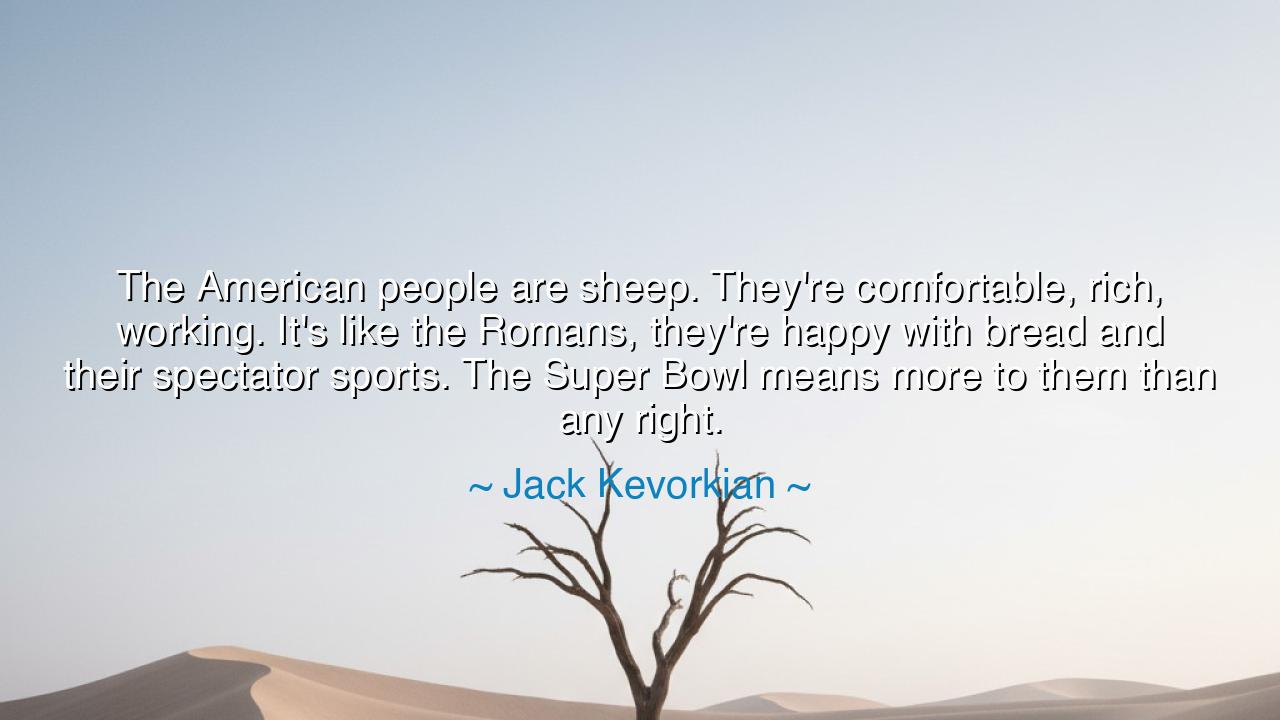
The American people are sheep. They're comfortable, rich
The American people are sheep. They're comfortable, rich, working. It's like the Romans, they're happy with bread and their spectator sports. The Super Bowl means more to them than any right.






Jack Kevorkian once thundered: “The American people are sheep. They’re comfortable, rich, working. It’s like the Romans, they’re happy with bread and their spectator sports. The Super Bowl means more to them than any right.” These words are sharp as a sword and heavy as stone, a lament and a warning to those who would trade vigilance for comfort, liberty for distraction. They strike at the heart of human weakness: the ease with which people surrender their freedom when fed with abundance and entertained with spectacle.
At the center of Kevorkian’s words lies the ancient metaphor of bread and circuses. In the days of Rome, emperors discovered that they could pacify the restless masses by providing them with grain to fill their bellies and games to thrill their eyes. The people, lulled by gladiatorial contests and the roar of the Circus Maximus, forgot to question corruption, injustice, and tyranny. So long as they were amused, they did not resist. Kevorkian saw in modern America this same danger, where the Super Bowl and other spectacles of sport became more revered than the sacred duties of citizenship, more exciting than the defense of rights hard-won by ancestors.
History gives us a stern example of this truth. When the Roman Republic gave way to the Empire, citizens who once debated fiercely in the Senate and fought for their civic voice became spectators rather than participants. Julius Caesar, Augustus, and their successors understood the psychology of the crowd: keep them fed and entertained, and they will not rise. The loss of liberty was hidden beneath parades, games, and free loaves of bread. In this way, the people themselves, distracted and complacent, became partners in their own decline. Kevorkian’s comparison warns us that no democracy, however strong, is immune to this decay of spirit.
Yet his words are not meant only to condemn, but to awaken. To call people sheep is not only to insult, but to urge them to become shepherds of their own destiny once more. Sheep are docile, content to follow, blind to the danger of wolves. But men and women, when stirred by truth, can be lions—guardians of freedom, seekers of justice, builders of civilizations. Kevorkian’s cry is thus a call to shake off complacency, to remember that rights are not preserved by comfort, but by vigilance and sacrifice.
The Super Bowl, in his example, is not evil in itself—it is but a symbol of distraction. There is no harm in joy, no fault in gathering for games, just as the Romans themselves once rejoiced at their festivals. The peril lies in letting these pleasures overshadow the weightier matters of justice, liberty, and civic duty. Entertainment is a gift, but when it becomes the altar at which a nation worships, the soul of that nation begins to erode.
The lesson, then, is clear: do not surrender your mind and spirit to bread and circuses. Enjoy the pleasures of life—yes, cheer for your teams, feast at your tables—but do not let them silence your voice or blind you to the responsibilities of freedom. Remember that rights, once lost, are rarely regained without struggle. Comfort is fleeting, but justice is eternal.
So let this teaching be passed on: be not sheep, lulled into slumber by abundance and spectacle. Be citizens, awake and watchful. Ask questions of your leaders, guard the liberties handed down to you, and remember that every right you neglect is a chain forged for your descendants. For if the Romans fell while the crowds cheered at the circus, so too can any people fall who forget that freedom requires more than bread, more than games—it requires courage, vigilance, and the will to stand awake when others sleep.






AAdministratorAdministrator
Welcome, honored guests. Please leave a comment, we will respond soon